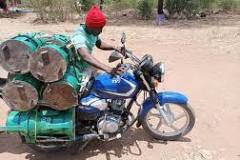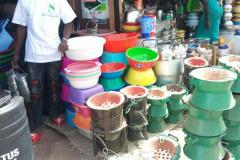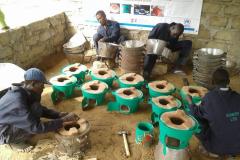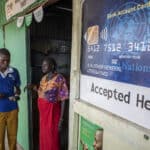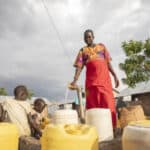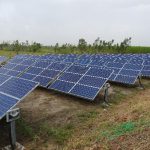Homegrown Millers Limited is a milling company specializing in the production and distribution of maize meal flour, branded as PAMOJA®. The company targets marginalized and low-income customers, providing affordable and high-quality fortified maize flour primarily used for ugali, a staple food in Kenyan communities. With the support from KKCF, Homegrown Millers Limited is expanding into the Kakuma-Kalobeyei area by establishing a production plant with an animal feed division to utilize byproducts effectively.
Funding Window: Private Sector Window
Private Sector Window
Kenya Bankers Sacco Financial Services
Kenya Bankers Sacco is a Savings and Credit Cooperative Organization (SACCO) dedicated to providing affordable financial services to members and customers. Regulated by the Sacco Societies Regulatory Authority, Kenya Bankers Sacco oversees eight branches and three sub-branches across Kenya. The company’s primary focus to mobilize deposits, offereconomical credit, and educate members on personal finance. With support from KKCF, Kenya Bankers Sacco will extend 4800 cumulative loans and savings services to refugees and the host community in the Kakuma – Kalobeyei area. It will alsoenroll 300 new members.
Migingo Fish Supplies Limited Aquaculture
Migingo Fish Supplies Limited deals in the supply and distribution of fresh and frozen fish. The company sells three main types of fish: Tilapia, Nile Perch and Mackerel. The company also offers structured quality and food safety management trainings to small and medium sized enterprises (SMEs), especially those owned by women and youth. To address business financing limitations, the company offers trade credit to the SMEs to pay back the supplied fish upon sale. With support from KKCF, Migingo Fish Supplies Ltd will establish an ice plant in Lodwar town, as well as install cold storage depots and satellite distribution centers in Kakuma and Kalobeyei.
Ziwani Poultry Enterprise Limited
Ziwani Poultry Enterprise is an agribusiness that supports small holder farmers to produce improved chicken and duck breeds.
The business also offers monthly training to small-scale farmers and incubation services. Through the KKCF funding, the company is improving the chicken value chain in the Kakuma Kalobeyei area by linking farmers to markets and availing equipment and services. The company will create jobs and improve the capacity of small holder farmers.
Company FAQs
What attracted you to the Kakuma/Kalobeyei area? Why did you choose to apply for the KKCF funding?
There was no completion for Ziwani Poultry Enterprises Limited, and we were encouraged by the fact that KKCF would take up some of the risk by offering the grant.
What do you look forward to doing in Kakuma/Kalobeyei? How do you see your business growing in the next 5 years? What challenges have you had to overcome?
The main challenge for us was the issue of land acquisition, and then finding a water source to sink a borehole on it. Construction material is very expensive, yet we needed cement, rebars, iron sheets etc.
I expect my business to grow since I have networked with a number of stakeholders and farmers who are keen on buying chicks from us.
What are the expected impacts you foresee in the Kakuma and Kalobeyei area following your interventions?
Pastoralists will diversify their livestock and start poultry farming as a way of building resilience in the face of prevailing drought in the region that impacts the large herds of goats, sheep, cows and camels negatively. They will also start consuming more chicken meat and eggs. Kakuma and Kalobeyei as a market place has a big population which translates to customers for our products
What advice would you give other SMEs in fragile/difficult situations with refugees living among their host communities?
The best advice in these circumstances is to always persist in what they do, knowing that it will eventually pay off. They can also diversify their enterprises to increase revenue inlets.
The Hive Limited
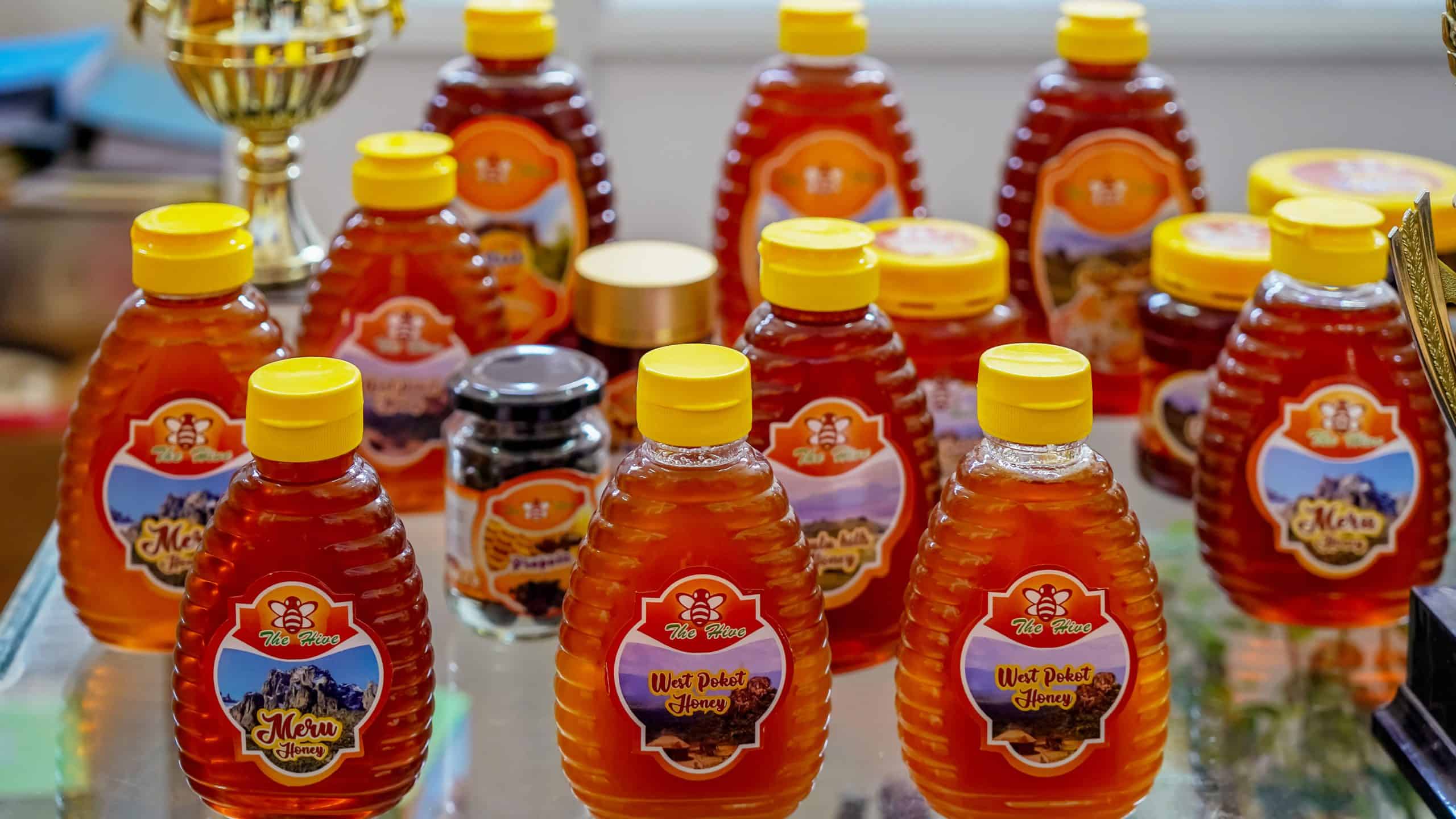
The Hive is a leading specialist in modern beekeeping equipment and beekeeping services in Kenya where it works closely with beekeepers focusing on increasing production and quality of bee products such as honey and beeswax.
The Hive Limited over the years has focused on increasing quantities of honey, wax and other bee products to meet the high demand. The company which has commercial hubs in West Pokot, Baringo, Turkana, Makueni, works with beekeepers to form Self-help groups and transforms them into co-operatives. The numerous innovations made by The Hive Limited have transformed livelihoods, food security, environmental conservation as well as crop yield quality in many aspects.
Through the KKCF funding, the company is helping tap the huge beekeeping potential in Kakuma and Kalobeyei through a commercial beekeeping hub that will provide economic and nutritional benefits among refugees and host communities.
Company FAQs
What attracted you to the Kakuma/Kalobeyei area? Why did you choose to apply for the KKCF funding?
The funding objectives were aligned to those of The Hive Ltd, and KKCF funding presented an opportunity to expand the Company’s portfolio considering that Turkana offers high potential for beekeeping. Although The Hive Ltd had undertaken beekeeping interventions previously in Turkana, KKCF presented an opportunity to set up a more holistic investment on a larger scale.
What do you look forward to doing in Kakuma/Kalobeyei? How do you see your business growing in the next 5 years? What challenges have you had to overcome?
The Hive Limited looks forward to promoting good practices in beekeeping through training and the provision of extension services to enhance production and productivity. This will be achieved with the establishment of two beekeeping commercial hubs and excellence centres in Kalobeyei and Oropoi. The Company intends to support beekeepers to increase the quantities of honey as well as ensuring it is market ready by improving its quality. The Company’s demand for honey currently stands at 600MT annually for its 12 shops across the country, and it is likely to increase further.
The main challenge facing The Hive Ltd. is the dependency mindset among the local community due to high poverty levels as well as the non-commercial approaches to beekeeping previously undertaken by
other development partners in the area. The expectation for hand-outs is persistent, thus undermining the commercial approach that Company intends to take for the project.
What are some of the foreseeable impacts in the Kakuma and Kalobeyei area following your interventions?
The Hive Ltd will provide a market for all honey produced among beekeepers in Kalobeyei and Oropoi. Our interventions will increase incomes among beekeeping households from the sale of honey to the
two commercial hubs. We will also create employment opportunities for the local community, including 23 formal jobs, as well as utilising both skilled and unskilled labour among the local community. Our commercial approach will unlock the potential and stimulate the growth of beekeeping activities in Oropoi and Kalobeyei. We will promote modern beekeeping technologies and equipment, and secure inclusion for
women and Persons with Disability.
What advice would you give other SMEs that are working in fragile/difficult situations, with refugees and their host communities?
There are enough opportunities to transform the lives of communities. Some of these require a shift in the current approaches and interventions. Integrating commercial approaches with charity interventions to address poverty, increases the potential for higher impact.
Gallery
Renewvia Energy Limited
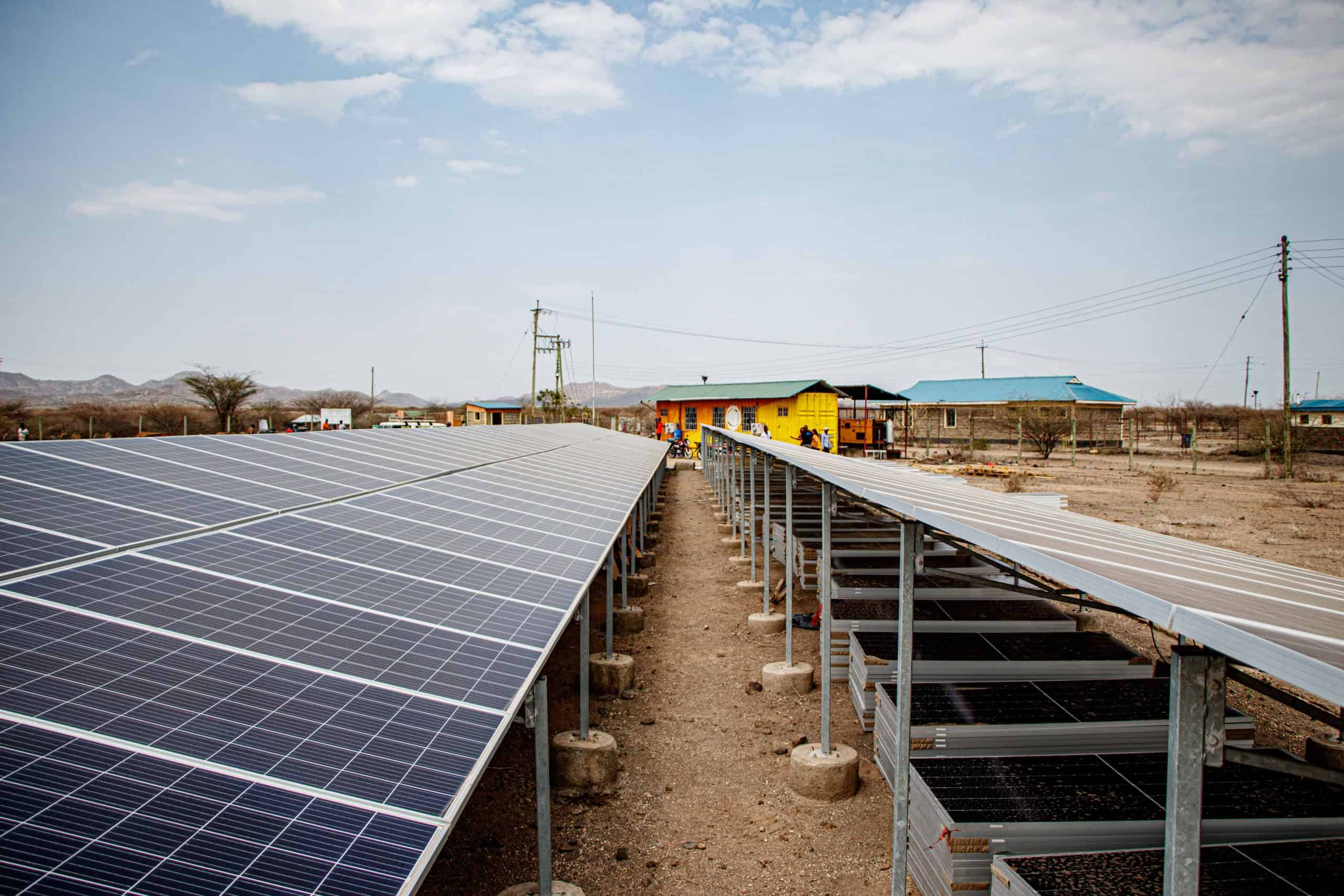
Renewvia Energy Kenya is an energy company that designs and constructs solar mini grids, supplying underserved communities with reliable and affordable electricity
The business seeks to transforms lives through providing reliable, modern,safe, and affordable electricity to low income and densely populated areas that are underserved or far from the Kenya power. In Kakuma and Kalobeyei they have connected institutions such as UNCHR, World Food Programme and Norwegian Refugee Council. Through electricity connections, Renewvia Energy has brought new life in the area from enabling children to study at night, allowing families to connect and charge household appliances like phones, fridges and television that improves their social cohesion and exposure to connecting business to operate late in the night and use refrigerators to preserve perishable commodities.
Through the KKCF funding, the company will be expanding their capacity and increase connections in the Kalobeyei settlement area.
Visit the Renewvia website here: https://www.renewvia.com/
Company FAQs
What attracted you to the Kakuma/Kalobeyei area? Why did you choose to apply for the KKCF funding?
Renewvia’s plans for Kalobeyei Settlement commenced in 2018, and by September 2019, the company’s operations were up and running. We designed and built a 60kWp Solar mini-grid that serves over 500 residential and commercial customers. The initial design would have served 350 connections, but people’s desire for electricity connection increased exponentially beyond Renewvia’s designed capacity. Demand
has grown further since 2019, and we had been seeking additional funding to expand the mini-grid to meet this demand. The KKCF opportunity was crucial for us to expand our system, allowing more people in the camp to access electricity while maintaining our low tariffs – a possibility enabled by this kind of grant funding.
What do you look forward to doing in Kakuma/Kalobeyei? How do you see your business growing in the next 5 years? What challenges have you had to overcome?
We have always seen the huge potential for our business to grow in Kalobeyei. The sheer number of people living in the camp without access to a basic need such as electricity presents a huge business opportunity. The economic activity in the Kakuma/Kalobeyei area is also robust, with many hundreds of operational small businesses. Beyond this, we believe that with the expansion of our site, the overall economic and social development of the community will be pushed forward. Our intervention will supply an additional 2,250 customers, and we are excited to see the knock-on effects as more people gain access to a clean and affordable energy source for the first time. Our biggest challenge in the Kalobeyei community so far is linked to our inability to meet the rising demand for electricity with our current system. We are eager to expand the amount of power we can provide, in order to reach thousands of potential customers.
What are some of the foreseeable impacts in the Kakuma and Kalobeyei area following your interventions?
When the system expansion is complete, a total of about 3,000 customers, both residential and commercial, will have access to electricity from Renewvia in the Kalobeyei Settlement area. We collect
data on impact for pre- and post-connection at all of our of mini-grids, and expect to see improvements across a range of key impact areas. We measure the change and impact of having access to clean, affordable
and reliable electricity, specifically across 5 categories: Gender Equality, Productivity, Safety, Health and Business Activity. Within these 5 parameters, we have identified and are tracking specific key
performance indicators. Among others, we believe we will see improved household and business economics, a safer and more secure environment around the area of extension, and important impacts for women and girls in time-saving during their daily activities.
What advice would you give other SMEs that are working in fragile/difficult situations, with refugees and their host communities?
First and foremost, developing a positive relationship and understanding with the community, local government, and other organisations working in the area, is critical. In this environment, there are a lot of activities happening and information flow and expectations can be complex. It is essential to align with all actors so that the solution being promoted is one that makes sense, given the circumstances. It also needs to be well
understood and truly desired by the community.
Gallery
Rafode Limited
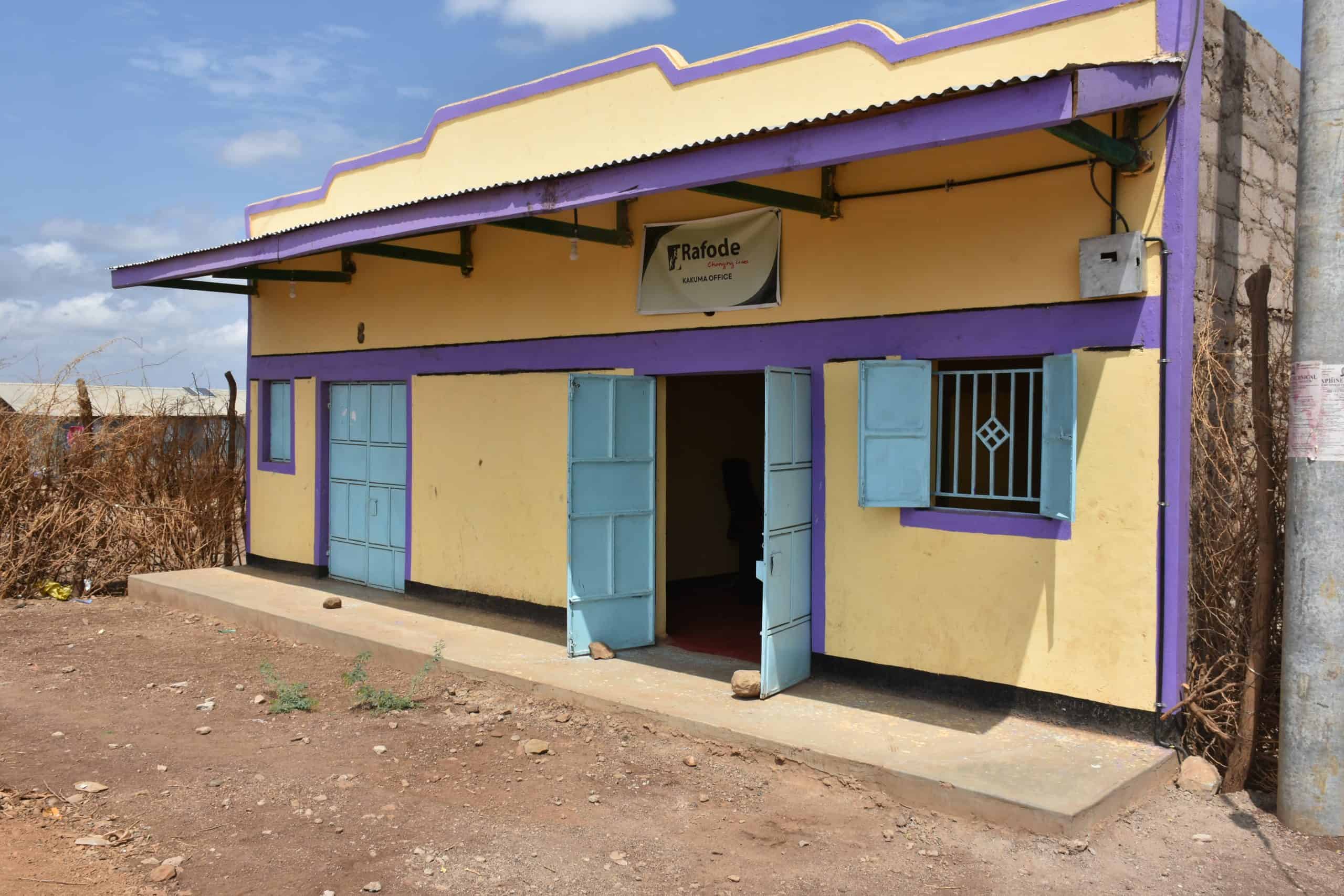
Rafode is a micro-finance company that provides financial services and renewable energy products (solar lamps and energy savings cookstoves) to low-income rural communities who live below $3 per day.
Through the KKCF Funding, the company is expanding its operations to refugees in Kakuma Camp and Kalobeyei Settlement scheme to increase access to affordable financial services and quality renewable energy products.
Visit the Rafode website here: https://www.rafode.co.ke/
FAQs
What attracted you to the Kakuma/Kalobeyei area? Why did you choose to apply for the KKCF funding?
Rafode was interested working with refugee populations, hence the decision to venture into the northern part of Kenya, which is classified as underserved. We applied for the funding to support our entry into Turkana County.
What do you look forward to doing in Kakuma/Kalobeyei? How do you see your business growing in the next 5 years? What challenges have you had to overcome?
Our aim is to provide financial services and renewable energy products for both the host community and the refugees, to support their micro and small businesses and also for household use. We see the portfolio in Turkana County growing to over US$3,000,000 in the next 5 years.
The challenges we have faced so far include:
- The communication barrier, since most of the refugees do not speak English: To overcome this challenge, we have employed staff in the various regions to assist with translation.
- Trust issues: Many clients, in both the host and refugee communities, have expressed misgivings about issues to do with trust as a result of being conned before and losing
their savings. We are building trust by sensitising our clients and working with a faster turn-around time.
What are the expected impacts you foresee in the Kakuma and Kalobeyei area following your interventions?
- A significant increase in the use of renewable energy.
- Cash savings from no longer having to purchase expensive, unsafe and unsustainable fuels like charcoal or kerosene.
- Reduction in household and environmental pollution.
- Improved businesses and increased incomes.
What advice would you give other SMEs that are working in fragile/difficult situations and with refugees and their host communities?
- Develop products that attract clients in such areas by listening to their needs and understanding their income cycles.
- Employ local staff to build up confidence and support acceptance of the enterprise or intervention among the community.
GALLERY
Sunken Limited
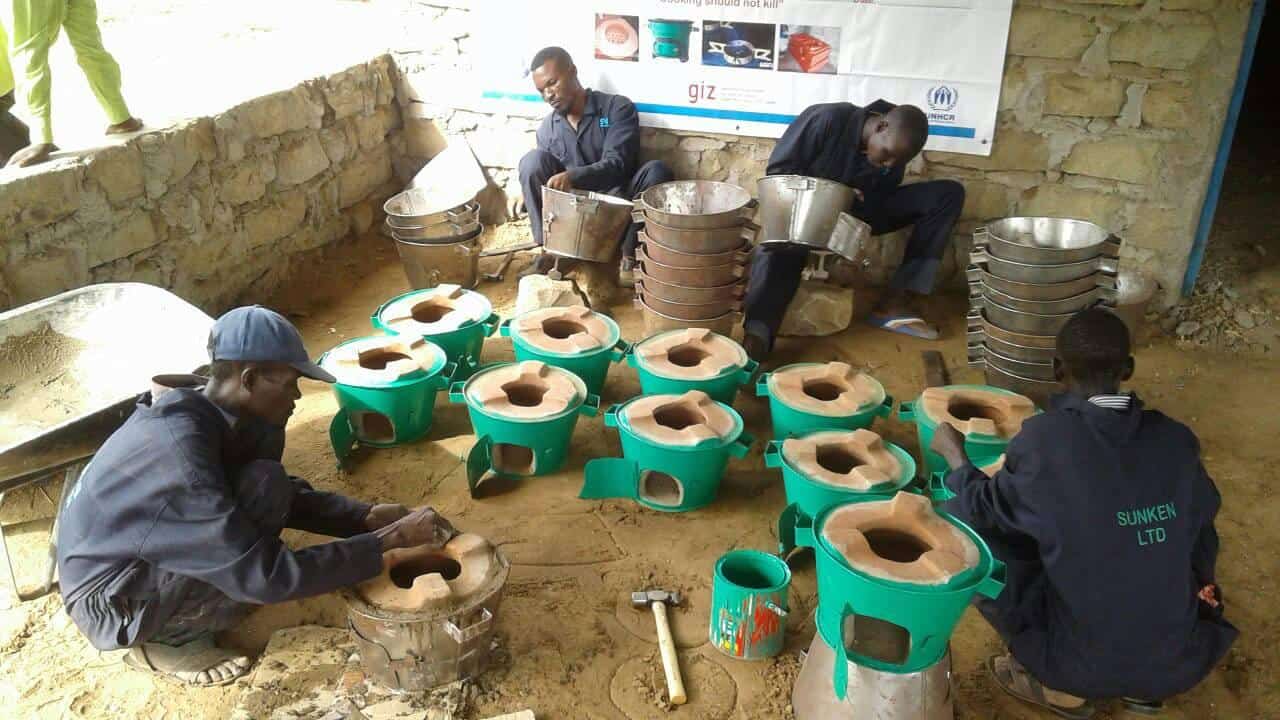
Sunken Limited is a producer of energy-saving cooking stoves specifically targeting low-income earners.
The company has set up a production company in Kakuma that allows it to utilize locally available raw materials. The stoves are predominantly marketed to refugees and the host community in the Kakuma Kalobeyei area. Sunken’s stoves have been recognized and recommended after local assessment by institutions such as SNV and UNHCR; studies have shown that the stoves have a high level of efficiency.
Through KKCF funding, Sunken is scaling up the production and distribution of cookstoves within Kakuma and Kalobeyei area. This will create jobs for the local community specifically for women and the youth, while reducing indoor smoke and resultant respiratory illness at household level. Additionally, the stoves will see increased saving and more disposable income from the reduced purchase of charcoal and firewood.
Company FAQs
What attracted you to the Kakuma/Kalobeyei area? Why did you choose to apply for the KKCF funding?
Sunken limited became involved in Kakuma through the market-based energy access Program initiated by SNV_Netherlands. Our attraction to Kakuma was based on the potential that lies in the northern frontier. With the improvement of the road network all the way to the Lokichogio and South Sudan border, business in this area was only going to thrive
and today we can see the number of businesses that have emerged, with banks opening their branches, come up from banks opening branches, as well as hotels and resorts setting up for business. In 2018 our first venture was the distribution of solar home systems in the region, and it is through this that we responded to the call for stive production units in the area.
We believe that in the initial 3 years of running the business in Kakuma, we made substantial impact in the community and our products were received very well in the market, KKCF was going to give us a boost in improving our supply to meet the demand that was growing at an alarming rate.
Today because of KKCF we have improved our cookstove production by 100% and expanded our distribution network to 106 LMEs throughout the camps.
What do you look forward to doing in Kakuma/Kalobeyei? How do you see your business growing in the next 5 years? What challenges have you had to overcome?
Sunken has been in Kakuma since 2018, One of our objectives is to be the go-to producer of the energy saving cookstoves sold in the region. We look forward to introducing new and affordable clean cooking methods to the population and play a major part in the eradication of the popular open fire method of cooking.
In Kakuma our biggest challenge in the time we have been here has been the recruitment of competent personnel and also getting the women in the region to heed our call for employment.
What are the expected impacts you foresee in the Kakuma and Kalobeyei area following your interventions?
Job Creation is the biggest social impact we look forward to delivering on, as we carry out training and skills development for the host communities and refugees. The jobs will also be created in the value chain from the production to transport and also procurement of locally available raw materials.
What advice would you give other SMEs that are working in fragile/difficult situations with refugees and their host communities?
Pricing is key: For all those getting into the Market for the first time, they need to put real thought into their pricing in order to be competitive, Analyse your competitions pricing. Kakuma is generally a low-income market.
Culture: Kakuma/Kalobeyei is home to numerous multi-Nationals with diverse cultures and this has a huge impact on the work-place, from recruitment to job allocation.
Gallery
Visit the Sunken website here: https://sunkenlimited.com/
